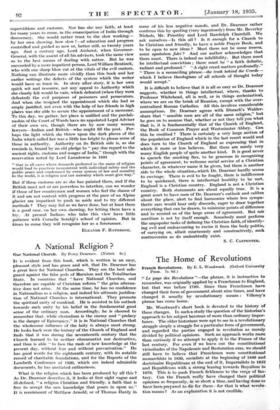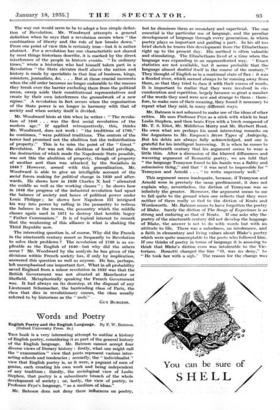The Home of Revolutions
French Revolutions. By E. L. Woodward. (Oxford University Press. 7s. 6d.)
"Le pays des Recolulions"—the phrase, it is instructive to remember, was originally applied by a Frenchman to England, but that was before 1789. Since then Frenchmen have changed their form of government about nine times, and have changed it usually by revolutionary means : Villeroy's phrase has come home.
Mr. Woodward's short book is devoted to the history of these changes. In such a study the question of the historian's approach to his subject becomes of more than ordinary impor- tance. The older historians were apt to see in a revolutionary struggle simply a struggle for a particular form of government, and regarded the parties engaged in revolution as merely divided by political opinions. Such an approach works more than curiously if we attempt to apply it to the France of the last century. For even if we leave out the constitutional vicissitudes of the Napoleonic and Restoration eras, we should still have to believe that Frenchmen were constitutional monarchists in 1830, socialists at the beginning of 1848 and doctrinaire Republicans at the end of it, Imperialists in 1852 and Republicans with a strong leaning towards Royalism in 1870. This is to push French fickleness to the verge of fan- tasy. Can the French really have changed their political opinions so frequently, in so short a time, and having done so have been prepared to die for them—for that is what revolu- tion means? As an explanation it is not credible. The way out would seem to be to adopt'a less simple defini- tion of Revolution. Mr. Woodward attempts a general definition when he says that a revolution occurs when " the combination of liberty and the rule of law breaks down." From one point of view this is certainly true—but it is rather abstract. For a revolution has one characteristic not shared by most things historians describe, it is marked by the direct interference of the people in historic events. " In ordinary times," wrote a historian who, had himself taken part in a Revolution " the State elevates itself above the nation anc history is made by specialists in that line of business, kings, ministers, journalists, &c. . . . But at those crucial moments when the old order becomes no longer endurable to the masses they break over the barrier excluding them from the political arena, sweep aside their constitutional repreientatives and create by their own interference the groundwork of a new regime." A revolution in fact occurs when the organization of the State power is no longer in harmony with that of society and when society itself is divided.
Mr. Woodward hints at this when he writes : " The revolu- tion of. 1848 . . . was the first social revolution of the modern age." If applied retrospectively, this, thinks Mr. Woodward, does not work : " the traditions of 1789," he continues, " were political traditions. The orators of the terror had promised not the abolition but the redistribution of property." This is to miss the point of the " Great " Revolution. For was not the abolition of feudal privilege, the destruction of which made the Napoleonic State possible, was not this the abolition of property, though of property of another sort than was attacked; by the Socialists in 1848 ? However, armed with this generalization, Mr. Woodward is able to give an intelligible account of the social forces making for political change in 1830 and after- wards. He shows how in 1830 Charles X had " alienated the middle as well as the working classes " ; he shows how in 1848 the progress of the industrial revolution had upset the balance of society and hence of political power under Louis Philippe ; he shows how Napoleon III intrigued his way into power by calling in the peasantry to redress the balance in the towns, the peasantry which the middle classes again used in 1871 to destroy that terrible bogey " Father Communism." It is of topical interest to remark that the weakening of this alliance is what is shaking the Third Republic now.
The interesting question is, of course, Why did the French in the nineteenth century resort so frequently to Revolution to solve their problems ? The revolution of 1789 is as ex- plicable as the English of 1640—but why did the others occur ? Mr. Woodward by the analysis he has given of the divisions within French society has, if only by implication, answered this question as well as anyone. He-has, perhaps, left unemphasized one important fact. What in all probability saved England from a minor revolution in 1832 was that the British Government was not situated at Manchester or Sheffield. Metaphorically speaking the French Government was. It had always on its doorstep, at the disposal of any Lieutenant Schumacher, the barricading class of Paris, the class that dies in revolutionary causes, the class usually referred to by historians as the " mob:"
GUY BURGESS.







































 Previous page
Previous page